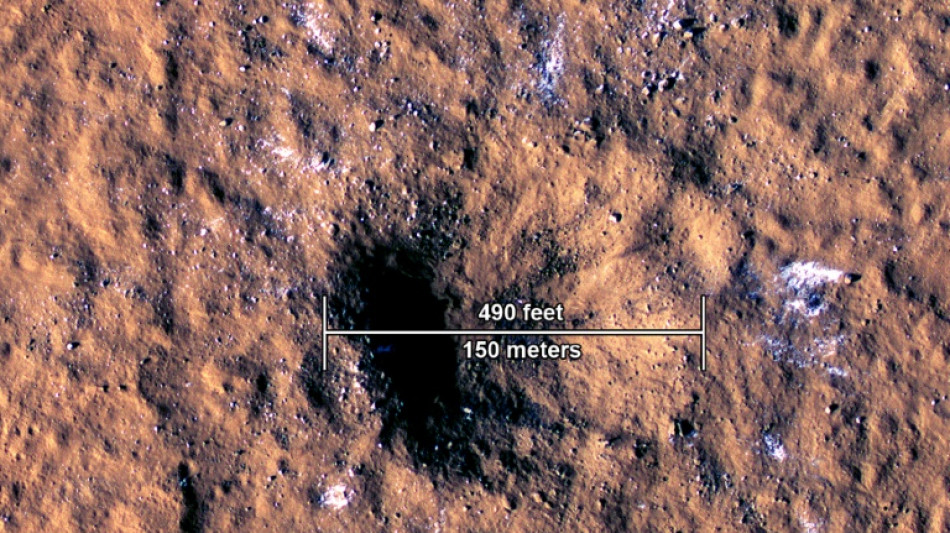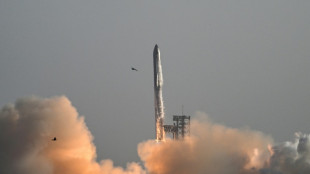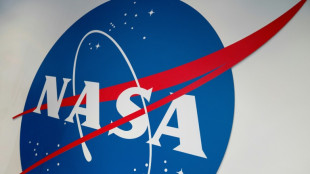
-
 Three in a row Piastri wins in Miami to lead McLaren one-two
Three in a row Piastri wins in Miami to lead McLaren one-two
-
Scheffler ties 72-hole PGA record in CJ Cup Byron Nelson romp

-
 Nicaragua says quitting UNESCO over press prize award
Nicaragua says quitting UNESCO over press prize award
-
Oscar Piastri wins Miami Grand Prix to lead McLaren one-two

-
 Bednarek runs this year's world-best 200m to win at Miami Grand Slam
Bednarek runs this year's world-best 200m to win at Miami Grand Slam
-
'Lucky number seven' for Ruud after beating Draper to clinch Madrid Open

-
 China's Zhao leads Williams 11-6 in world snooker final
China's Zhao leads Williams 11-6 in world snooker final
-
Far-right candidate tops Romania's presidential rerun

-
 Ryu takes wire-to-wire win at LPGA Black Desert Championship
Ryu takes wire-to-wire win at LPGA Black Desert Championship
-
Marseille held by fellow Champions League hopefuls Lille

-
 'Lonely' Palou cruises to win at IndyCar Alabama Grand Prix
'Lonely' Palou cruises to win at IndyCar Alabama Grand Prix
-
Zelensky says does 'not believe' Russian truce pledge

-
 US Fed expected to pause rate cuts again, await clarity on tariffs
US Fed expected to pause rate cuts again, await clarity on tariffs
-
Ruud beats Draper to win Madrid Open and claim maiden Masters

-
 Far-right candidate leads Romania's presidential rerun
Far-right candidate leads Romania's presidential rerun
-
Parag's six sixes in a row, Pant flops in IPL

-
 Howe hails Newcastle's 'ruthless' Isak after VAR drama in Brighton draw
Howe hails Newcastle's 'ruthless' Isak after VAR drama in Brighton draw
-
Pant woes continue as Lucknow lose to Punjab in IPL

-
 'Thunderbolts' strikes big, topping N.America box office
'Thunderbolts' strikes big, topping N.America box office
-
Kompany player-led shake-up returns Bayern to Bundesliga summit

-
 Leverkusen draw hands Kane's Bayern Bundesliga title
Leverkusen draw hands Kane's Bayern Bundesliga title
-
Chelsea sink champions Liverpool, Man Utd crash at Brentford

-
 Bielle-Biarrey lifts Bordeaux past Toulouse and into Champions Cup final
Bielle-Biarrey lifts Bordeaux past Toulouse and into Champions Cup final
-
Chelsea beat champions Liverpool to boost top five push

-
 Hammers' Potter reveals Paqueta's tears of frustration at Spurs draw
Hammers' Potter reveals Paqueta's tears of frustration at Spurs draw
-
Lyon's Champions League hopes hit by loss to Lens

-
 Israel vows retaliation against Iran, Yemen's Huthis over airport attack
Israel vows retaliation against Iran, Yemen's Huthis over airport attack
-
Man Utd 'need to change' after Brentford loss: Amorim

-
 China's Zhao dominates Williams 7-1 in first session of World Snooker final
China's Zhao dominates Williams 7-1 in first session of World Snooker final
-
Zelensky says does 'not believe' Russian truce promises

-
 Bielle-Biarrey double lifts Bordeaux past champions Toulouse and into Champions Cup final
Bielle-Biarrey double lifts Bordeaux past champions Toulouse and into Champions Cup final
-
Trump says 'I don't know' if must uphold US Constitution as president

-
 Brazil police foil Lady Gaga gig bomb plot
Brazil police foil Lady Gaga gig bomb plot
-
Godolphin in full bloom as Desert Flower wins 1000 Guineas

-
 Almeida wins Tour de Romandie as Evenepoel claims closing time-trial
Almeida wins Tour de Romandie as Evenepoel claims closing time-trial
-
Bolsonaro leaves hospital three weeks after abdominal surgery

-
 Man Utd crash at Brentford, Isak rescues Newcastle
Man Utd crash at Brentford, Isak rescues Newcastle
-
Romanians vote in tense presidential rerun as far right eyes win

-
 Lyon see off Racing to set up Challenge Cup final against Bath
Lyon see off Racing to set up Challenge Cup final against Bath
-
Kolkata survive Parag's six-hitting blitz to clinch IPL thriller

-
 Israel vows retaliation against Yemen's Huthis over airport attack
Israel vows retaliation against Yemen's Huthis over airport attack
-
Mbappe maintains Real Madrid Liga dream in Celta thriller

-
 UNESCO says Nicaragua quitting over press prize award
UNESCO says Nicaragua quitting over press prize award
-
Church donation box goes digital in Greece

-
 Germans mark liberation of Ravensbrueck Nazi camp
Germans mark liberation of Ravensbrueck Nazi camp
-
Missile hits Israel airport area in Huthi-claimed attack

-
 DeChambeau eyes PGA Championship battle after South Korea LIV win
DeChambeau eyes PGA Championship battle after South Korea LIV win
-
Chinese president to visit Russia on May 7-10: Kremlin

-
 'We don't care': weddings go on in Pakistan's Kashmir border
'We don't care': weddings go on in Pakistan's Kashmir border
-
Missile hits Israel airport area in attack claimed by Yemen's Huthis


Meteorite that smashed into Mars shook planet, NASA says
Scientists who study Mars on Thursday revealed the remarkable Christmas gift they received from the planet last year.
On December 24, 2021, a meteorite hit Mars' surface, triggering magnitude 4 tremors, which were detected by NASA's InSight spacecraft -- which landed on the planet four years ago -- some 2,200 miles (3,500 kilometers) away.
The true origin of this so-called marsquake was only confirmed when the Mars Reconnaissance Orbiter (MRO) was able to take a picture of the newly formed crater created by the hit when it flew over the impact site less than 24 hours later.
The image is impressive, showing blocks of ice that were spewed up onto the planet's surface around the 492-foot (150-meter) wide and 70-foot (21-meter) deep hole.
The crater is the largest ever observed since the MRO began its Mars orbit 16 years ago.
And though meteorite impacts on Mars are not rare, "we never thought we'd see anything that big," Ingrid Daubar, who works on the InSight and MRO missions, told reporters at a press conference Thursday.
Researchers estimate that the meteorite itself would have measured between 16 to 39 feet across. An object of that size would have disintegrated in Earth's atmosphere before falling to the ground here.
"It is simply the biggest meteorite impact on the ground that we have heard since science has been done with seismographs or seismometers," said planetology professor Philippe Lognonne, who participated in two studies related to the observation published in the journal Science Thursday.
NASA released an audio recording of the collision, which was made by speeding up the vibrations collected by the seismometer.
- 'Useful' ice presence -
The valuable information gathered in studying the crash will contribute to deeper knowledge of Mars' interior and the history of how the planet was created, scientists said.
The presence of ice, in particular, is "surprising," said Daubar, who also co-authored the two studies.
"This is the warmest spot on Mars, the closest to the equator, we've ever seen water ice," she said.
In addition to the information this discovery offers about the Martian climate, the presence of water at this latitude -- and not just near the poles -- could prove "really useful" for future human visitors to Mars, director of NASA's Planetary Science Division Lori Glaze said.
"We'd want to land the astronauts as near to the equator as possible," she said, to take advantage of warmer temperatures.
"That ice could be converted into water, oxygen or hydrogen," Glaze said.
The impact was powerful enough to generate seismic waves both down to the planet's core and across its crust horizontally, making it possible to study Mars' internal structure -- revealing that the crust on which InSight sits is less dense than the crust the waves traveled over from the crater site.
The end of InSight's mission -- which recorded more than 1,300 marsquakes in total -- could come in the next couple of months, according to Bruce Banerdt of NASA's Jet Propulsion Lab, due to the expected accumulation of dust on the lander's solar power panel.
It's "sad," he said, while celebrating that the probe worked "marvelously" for four years.
X.Karnes--AMWN


